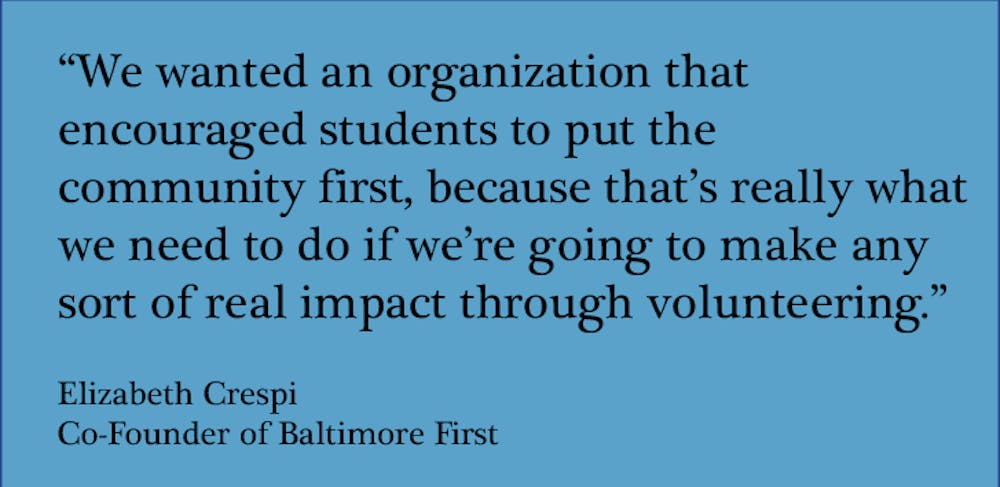In an effort to ensure student volunteers remain committed to local community service projects, senior Elizabeth Crespi co-founded Baltimore First, a student-led Center For Social Concern (CSC) program last January.
Baltimore First partners with local non-profit organizations, through which they offer various programs for student volunteers. Students are able to choose the programs that appeal to their interests.
These programs, which meet weekly, biweekly or monthly, include childcare programs like the St. Francis Neighborhood Center, gardening at the Civic Works urban farm in East Baltimore and feeding elderly residents at Keswick. One of Baltimore First’s programs, Club 1111, aims to provide relaxing activities for people with disabilities, such as getting fake tattoos from volunteers.
“We wanted an organization that encouraged students to put the community first, because that’s really what we need to do if we’re going to make any sort of real impact through volunteering,” Crespi said.
Prior to the organization’s founding, Crespi — currently president of Baltimore First — and other founding members were involved in community work independently as well as through the CSC. However, they felt that their work was not doing enough to create genuine engagement in the community.
After speaking to members of local community service organizations, Crespi said that they realized that Hopkins students have a negative reputation in Baltimore.
Community organizations felt that volunteers were not committed and were volunteering simply for the sake of resume building. Organizations also reported that volunteers who were genuinely interested in philanthropy drained their resources by working inconsistently.
According to Crespi, having consistent volunteers means that the organization does not have to waste time and resources reteaching the same skills to different people. Children, the elderly and the disabled also get a sense of stability by interacting with the same people.
“In terms of projects like Club 1111 where you’re working with people with disabilities, they really like to see the same faces every time,” Crespi said. “They recognize you, they get excited to see you.”
In order to foster consistency among volunteers, Baltimore First requires applicants to attend 80 percent of the program’s meetings every semester. To ensure that students choose the project that is right for them, all new members get a two week trial period in which they can try any program they want.
“I’m really excited about how well it’s going.” Crespi said. “We first of all just get raving reviews from all our community partners, which is our priority... Different organizations really trust us.”
Members of Baltimore First have attested to how the group’s emphasis on consistent, quality volunteering has changed their perspective on service and the Baltimore community as a whole.
Sophomore Kiahna Revan, one of the group’s directors of recruitment, spoke about how Baltimore First got her to care more about service.
“It was seeing the direct impact you have when you’re voluntarily going somewhere and doing something, when you care about it and you see people benefitting from your presence. It’s enriching,” Revan said. “That’s definitely something you can see in Club 1111, just talking to the people.”
Freshman Neha Gupta, the special events coordinator for Baltimore First, works at Keswick on Sunday mornings, feeding elderly residents and spending time with them.
“It makes Baltimore feel a little more like home,” Gupta said.
Crespi has also noted how members have become more thoughtful as they continue with the process. She has noticed that even students who start off on the fence about service end up incorporating service as a central aspect of their lives. She credits consistency as the catalyst.
Some students have been able to get jobs through the connections they made volunteering, and leaders of community organizations who have partnered with Baltimore First have been willing to write recommendation letters for students.
Volunteers like Revan also said that their work with Baltimore First provided much needed stress relief.
“Being in an organization like this forces you to get off campus and get out of that bubble and do some meaningful work,” Revan said. “It also allows me to focus less on academics and more on doing the things I enjoy.”
Junior Michael Ontiveros, another director of recruitment, explained that Baltimore First has plans to create events outside of service programming.
“We’re looking at having some workshops next semester to actually inform the Hopkins population, as well as anyone else in the community, about certain problems that we help address by volunteering,” Ontiveros said.
In doing so, the organization aims to offer students the chance to reflect on the impact they are making and the problems they are trying to fix, along with where these problems come from and what makes them so pervasive.





